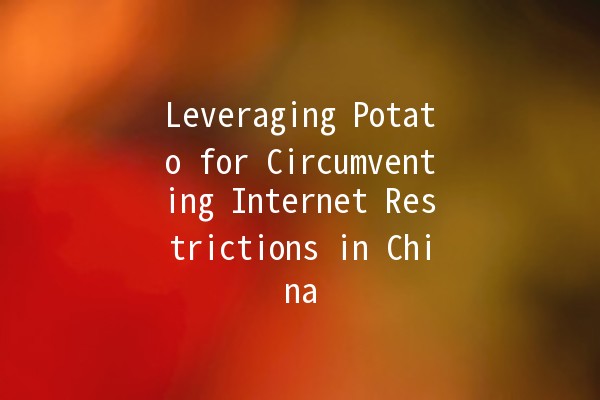In the age of the internet, access to information is essential for both personal and professional reasons. However, in certain regions, especially China, internet restrictions can dramatically hinder access to a wealth of information and resources that are available worldwide. This is where tools like Potato, a circumvention tool, come into play. This article explores the mechanisms of using Potato for bypassing these restrictions effectively, as well as techniques that can boost productivity while using such tools.
Understanding the Concept of "翻墙" (Circumventing Restrictions)

“翻墙,” literally meaning “climbing over the wall,” is a colloquial term used in China to describe bypassing the Great Firewall, which restricts access to various foreign websites and services. Potato is one of the effective tools available for this purpose.
What is Potato?
Potato is a userfriendly tool that provides a reliable method for bypassing internet filters. It comes with a simple interface and supports multiple platforms, ensuring versatility for users. Its capabilities range from accessing blocked websites to maintaining online privacy.
How Does Potato Work?
Understanding the mechanics behind Potato can enhance its usage:
VPN (Virtual Private Network): Potato uses a VPNlike mechanism to route your internet connection through different servers, making it appear as though the user is accessing the internet from another country.
Encryption: Potato encrypts your data, ensuring that your online activities are kept private and protected from eavesdropping.
Multiple Protocols: It supports various protocols to establish connections, providing flexibility depending on the user’s needs.
Key Techniques for Enhancing Productivity with Potato
Using Potato for circumventing internet restrictions can be significantly enhanced by following specific productivity techniques. Here are five practical tips to consider:
Tip Explanation: Adjusting the connection settings on Potato can lead to better performance.
Practical Application Example: Users can experiment with different server locations to find the fastest connection. For instance, if a user is located in Shanghai, connecting to a server in Hong Kong might offer lower latency than one in the US. Regularly testing servers ensures you are always using the fastest available option.
Tip Explanation: The internet is generally slower during peak usage times.
Practical Application Example: If you know that a particular website tends to be sluggish during the evenings, schedule your browsing for early morning or late night when fewer users are online. This technique is especially beneficial for downloading large files or streaming content.
Tip Explanation: Incorporating additional browser extensions can boost productivity when using Potato.
Practical Application Example: Extensions such as ad blockers can minimize distractions while browsing, allowing users to focus better. Additionally, productivity tools like Todoist can help keep users organized while using bypass tools for research or work.
Tip Explanation: Split tunneling allows users to choose which apps go through Potato and which do not.
Practical Application Example: A user can configure Potato to route only specific applications, such as their browser or workrelated software, through the VPN connection. This ensures that personal applications, which do not require access to blocked content, use the regular internet connection, optimizing overall speed and efficiency.
Tip Explanation: Regular updates can enhance performance and security.
Practical Application Example: Users should check for updates to Potato frequently. Updated versions often include performance improvements and new features. Additionally, ensure your operating system and browser are up to date to mitigate security vulnerabilities.
Frequently Asked Questions
Using Potato and similar tools falls into a grey area legally. While many individuals use them for personal or professional reasons, the act of circumventing restrictions can be viewed as a violation of local laws. Users should exercise caution and be informed of the potential risks and consequences.
Yes, Potato is compatible with both desktop and mobile platforms. Users can download the app on their smartphones or tablets, providing them with the flexibility to access restricted content onthego.
While there may be some initial latency due to encryption and rerouting through different servers, users often find that the performance is comparable to or even better than standard connections. Experimentation with servers often reveals faster options.
If Potato encounters issues, users should first check their internet connection. If that is stable, try reconnecting to a different server or restarting the application. If problems persist, consult the support or community forums for troubleshooting tips.
Potato uses strong encryption protocols to protect user data while browsing. However, users should also be cautious about the sites they visit and the personal data they share online, as no tool can guarantee 100% security.
To maximize performance, regularly switch servers, keep your software up to date, opt for less crowded times for critical tasks, and use split tunneling to minimize unnecessary load on the VPN.
Using tools like Potato to circumvent internet censorship opens up a world of information and resources. By applying these productivity techniques, users can maximize their experience and access the necessary tools to navigate the online world more efficiently. Remembering to stay informed about local laws and operating securely will ensure a smoother browsing experience.